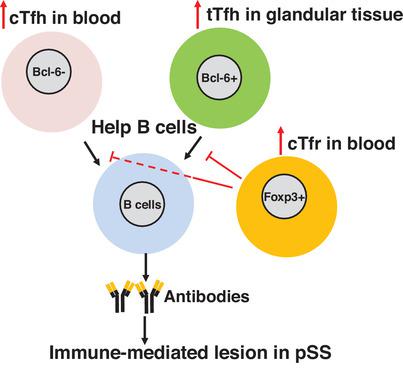当前位置:
X-MOL 学术
›
J. Leukoc. Biol.
›
论文详情
Our official English website, www.x-mol.net, welcomes your
feedback! (Note: you will need to create a separate account there.)
Follicular helper T cells and follicular regulatory T cells in the immunopathology of primary Sjögren's syndrome
Journal of Leukocyte Biology ( IF 3.6 ) Pub Date : 2020-12-15 , DOI: 10.1002/jlb.5mr1020-057rr Weiqian Chen 1 , Fan Yang 2 , Guanhua Xu 1 , Jilin Ma 3 , Jin Lin 1
Journal of Leukocyte Biology ( IF 3.6 ) Pub Date : 2020-12-15 , DOI: 10.1002/jlb.5mr1020-057rr Weiqian Chen 1 , Fan Yang 2 , Guanhua Xu 1 , Jilin Ma 3 , Jin Lin 1
Affiliation

|
Primary Sjögren's syndrome (pSS) is a chronic autoimmune disease, characterized by lymphocytic infiltration into exocrine glands, which causes dry eyes, dry mouth, and systemic damage. Although the precise etiology of pSS is not clear yet, highly activated B cells, abundant anti‐SSA/Ro, and anti‐SSB/La autoantibodies are the hallmarks of this disease. Follicular helper T cells (Tfh), a subset of CD4+T cells, with cell surface receptors PD‐1 and CXCR5, express ICOS, transcription factor Bcl‐6, and a cytokine IL‐21. These cells help in the differentiation of B cells into plasma cells and stimulate the formation of germinal center (GC). Previous studies have demonstrated abundant Tfh cells in the peripheral blood and salivary glands (SGs) of the patients with pSS, correlated with extensive lymphocytic infiltration of the SGs and high disease activity scores. Patients with pSS who are treated with abatacept (CTLA‐4 Ig) show fewer circulating Tfh cells, reduced expression of ICOS, and lower disease activity scores. Recently identified follicular regulatory T (Tfr) cells, a subset of regulatory T cells, control the function of Tfh cells and the GC reactions. Here, we summarize the observed alterations in Tfh and Tfr cell numbers, activation state, and circulating subset distribution in pSS. Our goal is to improve the understanding of the roles of Tfh and Tfr cells (surface marker expression, cytokine production, and transcription factors) in the pathogenesis of pSS, thus contributing to the identification of candidate therapeutic agents for this disease.
中文翻译:

原发性干燥综合征的免疫病理学中的卵泡辅助性T细胞和卵泡调节性T细胞
原发性干燥综合征(pSS)是一种慢性自身免疫性疾病,其特征是淋巴细胞浸入外分泌腺,导致眼睛干涩,口干和全身性损伤。尽管尚不清楚pSS的确切病因,但高度活化的B细胞,丰富的抗SSA / Ro和抗SSB / La自身抗体是该疾病的标志。滤泡辅助性T细胞(Tfh),CD4 +的子集具有细胞表面受体PD-1和CXCR5的T细胞表达ICOS,转录因子Bcl-6和细胞因子IL-21。这些细胞有助于B细胞分化为浆细胞,并刺激生发中心(GC)的形成。先前的研究表明,患有pSS的患者外周血和唾液腺(SGs)中存在丰富的Tfh细胞,与SGs的广泛淋巴细胞浸润和较高的疾病活动性评分相关。用abatacept(CTLA-4 Ig)治疗的pSS患者表现出循环Tfh细胞更少,ICOS表达降低和疾病活动评分降低。最近发现的卵泡调节性T细胞(Tfr)是调节性T细胞的一个子集,控制着Tfh细胞的功能和GC反应。在这里,我们总结了在Tfh和Tfr细胞数,激活状态,pSS中的循环子集分布。我们的目标是增进对Tfh和Tfr细胞(表面标志物表达,细胞因子生成和转录因子)在pSS发病机理中的作用的了解,从而有助于鉴定该疾病的候选治疗剂。
更新日期:2021-01-25
中文翻译:

原发性干燥综合征的免疫病理学中的卵泡辅助性T细胞和卵泡调节性T细胞
原发性干燥综合征(pSS)是一种慢性自身免疫性疾病,其特征是淋巴细胞浸入外分泌腺,导致眼睛干涩,口干和全身性损伤。尽管尚不清楚pSS的确切病因,但高度活化的B细胞,丰富的抗SSA / Ro和抗SSB / La自身抗体是该疾病的标志。滤泡辅助性T细胞(Tfh),CD4 +的子集具有细胞表面受体PD-1和CXCR5的T细胞表达ICOS,转录因子Bcl-6和细胞因子IL-21。这些细胞有助于B细胞分化为浆细胞,并刺激生发中心(GC)的形成。先前的研究表明,患有pSS的患者外周血和唾液腺(SGs)中存在丰富的Tfh细胞,与SGs的广泛淋巴细胞浸润和较高的疾病活动性评分相关。用abatacept(CTLA-4 Ig)治疗的pSS患者表现出循环Tfh细胞更少,ICOS表达降低和疾病活动评分降低。最近发现的卵泡调节性T细胞(Tfr)是调节性T细胞的一个子集,控制着Tfh细胞的功能和GC反应。在这里,我们总结了在Tfh和Tfr细胞数,激活状态,pSS中的循环子集分布。我们的目标是增进对Tfh和Tfr细胞(表面标志物表达,细胞因子生成和转录因子)在pSS发病机理中的作用的了解,从而有助于鉴定该疾病的候选治疗剂。











































 京公网安备 11010802027423号
京公网安备 11010802027423号